International Students in Canada: Understanding Culture Shock
VerifiedAdded on 2023/06/14
|5
|1500
|53
Essay
AI Summary
This essay explores the phenomenon of culture shock experienced by international students in Canada, detailing the various stages including the honeymoon phase, negotiation, adjustment, and acceptance. It highlights the social challenges such as language barriers and communication difficulties arising from cultural differences in individualism and collectivism. Furthermore, the essay discusses cultural challenges related to differences in food, clothing, values, and religion, which can lead to feelings of isolation and depression. The financial challenges are also addressed, focusing on the high cost of living in Canada and the need for students to participate in social activities to integrate, leading to potential financial strain. The essay concludes by suggesting solutions such as university-led seminars and promoting unity within society to help international students overcome culture shock and successfully adapt to their new environment. Desklib provides similar past papers and solved assignments for students.
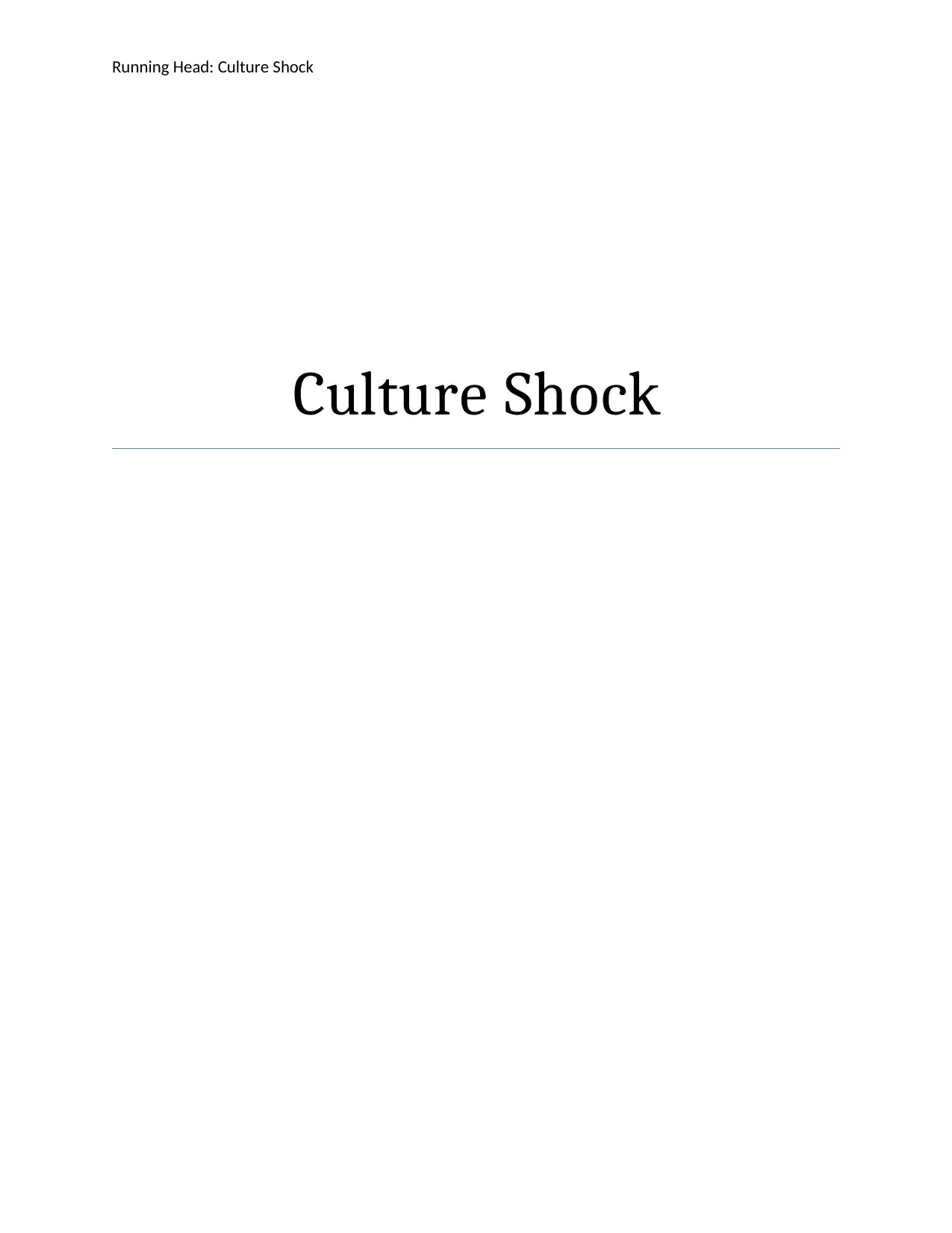
Running Head: Culture Shock
Culture Shock
Culture Shock
Paraphrase This Document
Need a fresh take? Get an instant paraphrase of this document with our AI Paraphraser
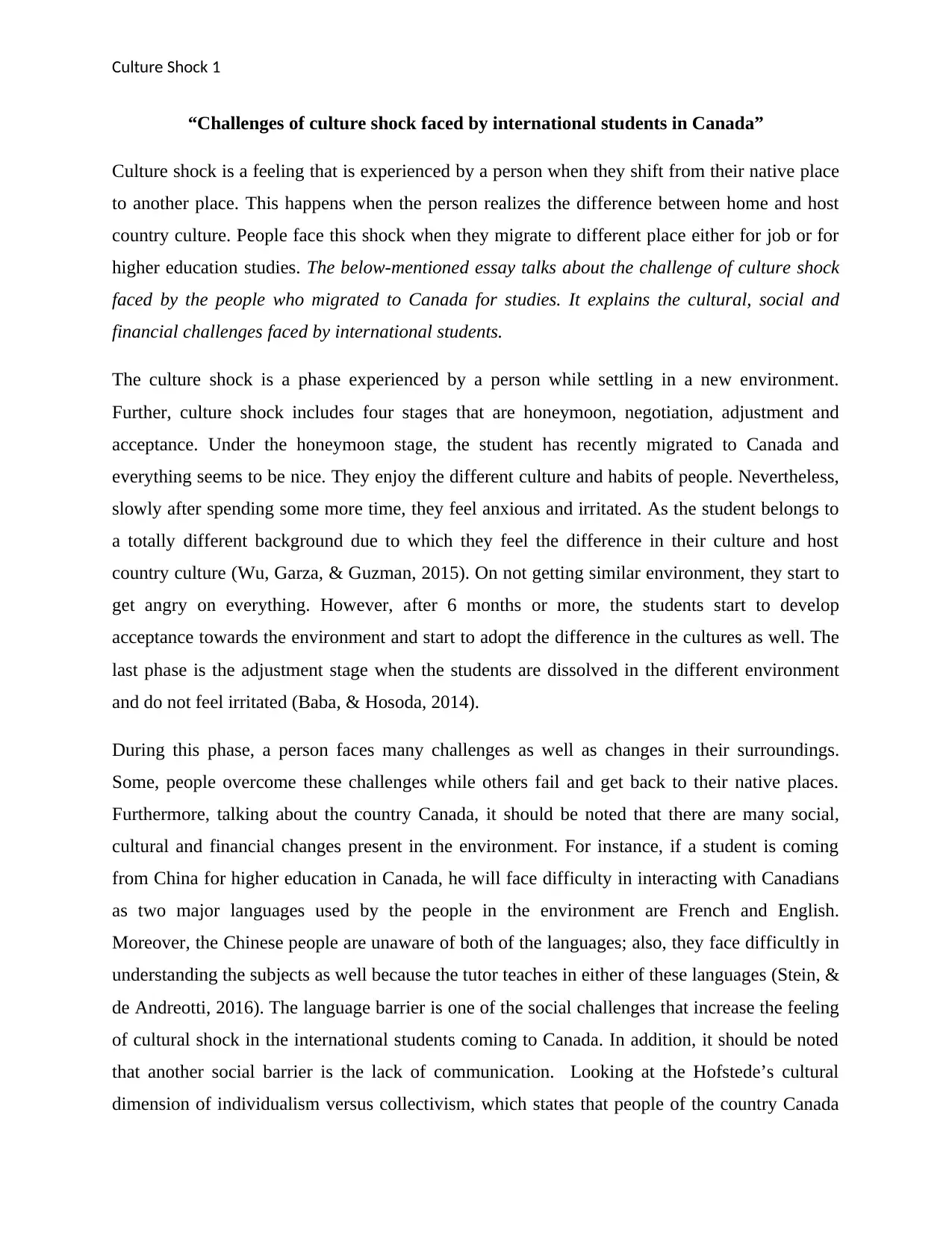
Culture Shock 1
“Challenges of culture shock faced by international students in Canada”
Culture shock is a feeling that is experienced by a person when they shift from their native place
to another place. This happens when the person realizes the difference between home and host
country culture. People face this shock when they migrate to different place either for job or for
higher education studies. The below-mentioned essay talks about the challenge of culture shock
faced by the people who migrated to Canada for studies. It explains the cultural, social and
financial challenges faced by international students.
The culture shock is a phase experienced by a person while settling in a new environment.
Further, culture shock includes four stages that are honeymoon, negotiation, adjustment and
acceptance. Under the honeymoon stage, the student has recently migrated to Canada and
everything seems to be nice. They enjoy the different culture and habits of people. Nevertheless,
slowly after spending some more time, they feel anxious and irritated. As the student belongs to
a totally different background due to which they feel the difference in their culture and host
country culture (Wu, Garza, & Guzman, 2015). On not getting similar environment, they start to
get angry on everything. However, after 6 months or more, the students start to develop
acceptance towards the environment and start to adopt the difference in the cultures as well. The
last phase is the adjustment stage when the students are dissolved in the different environment
and do not feel irritated (Baba, & Hosoda, 2014).
During this phase, a person faces many challenges as well as changes in their surroundings.
Some, people overcome these challenges while others fail and get back to their native places.
Furthermore, talking about the country Canada, it should be noted that there are many social,
cultural and financial changes present in the environment. For instance, if a student is coming
from China for higher education in Canada, he will face difficulty in interacting with Canadians
as two major languages used by the people in the environment are French and English.
Moreover, the Chinese people are unaware of both of the languages; also, they face difficultly in
understanding the subjects as well because the tutor teaches in either of these languages (Stein, &
de Andreotti, 2016). The language barrier is one of the social challenges that increase the feeling
of cultural shock in the international students coming to Canada. In addition, it should be noted
that another social barrier is the lack of communication. Looking at the Hofstede’s cultural
dimension of individualism versus collectivism, which states that people of the country Canada
“Challenges of culture shock faced by international students in Canada”
Culture shock is a feeling that is experienced by a person when they shift from their native place
to another place. This happens when the person realizes the difference between home and host
country culture. People face this shock when they migrate to different place either for job or for
higher education studies. The below-mentioned essay talks about the challenge of culture shock
faced by the people who migrated to Canada for studies. It explains the cultural, social and
financial challenges faced by international students.
The culture shock is a phase experienced by a person while settling in a new environment.
Further, culture shock includes four stages that are honeymoon, negotiation, adjustment and
acceptance. Under the honeymoon stage, the student has recently migrated to Canada and
everything seems to be nice. They enjoy the different culture and habits of people. Nevertheless,
slowly after spending some more time, they feel anxious and irritated. As the student belongs to
a totally different background due to which they feel the difference in their culture and host
country culture (Wu, Garza, & Guzman, 2015). On not getting similar environment, they start to
get angry on everything. However, after 6 months or more, the students start to develop
acceptance towards the environment and start to adopt the difference in the cultures as well. The
last phase is the adjustment stage when the students are dissolved in the different environment
and do not feel irritated (Baba, & Hosoda, 2014).
During this phase, a person faces many challenges as well as changes in their surroundings.
Some, people overcome these challenges while others fail and get back to their native places.
Furthermore, talking about the country Canada, it should be noted that there are many social,
cultural and financial changes present in the environment. For instance, if a student is coming
from China for higher education in Canada, he will face difficulty in interacting with Canadians
as two major languages used by the people in the environment are French and English.
Moreover, the Chinese people are unaware of both of the languages; also, they face difficultly in
understanding the subjects as well because the tutor teaches in either of these languages (Stein, &
de Andreotti, 2016). The language barrier is one of the social challenges that increase the feeling
of cultural shock in the international students coming to Canada. In addition, it should be noted
that another social barrier is the lack of communication. Looking at the Hofstede’s cultural
dimension of individualism versus collectivism, which states that people of the country Canada
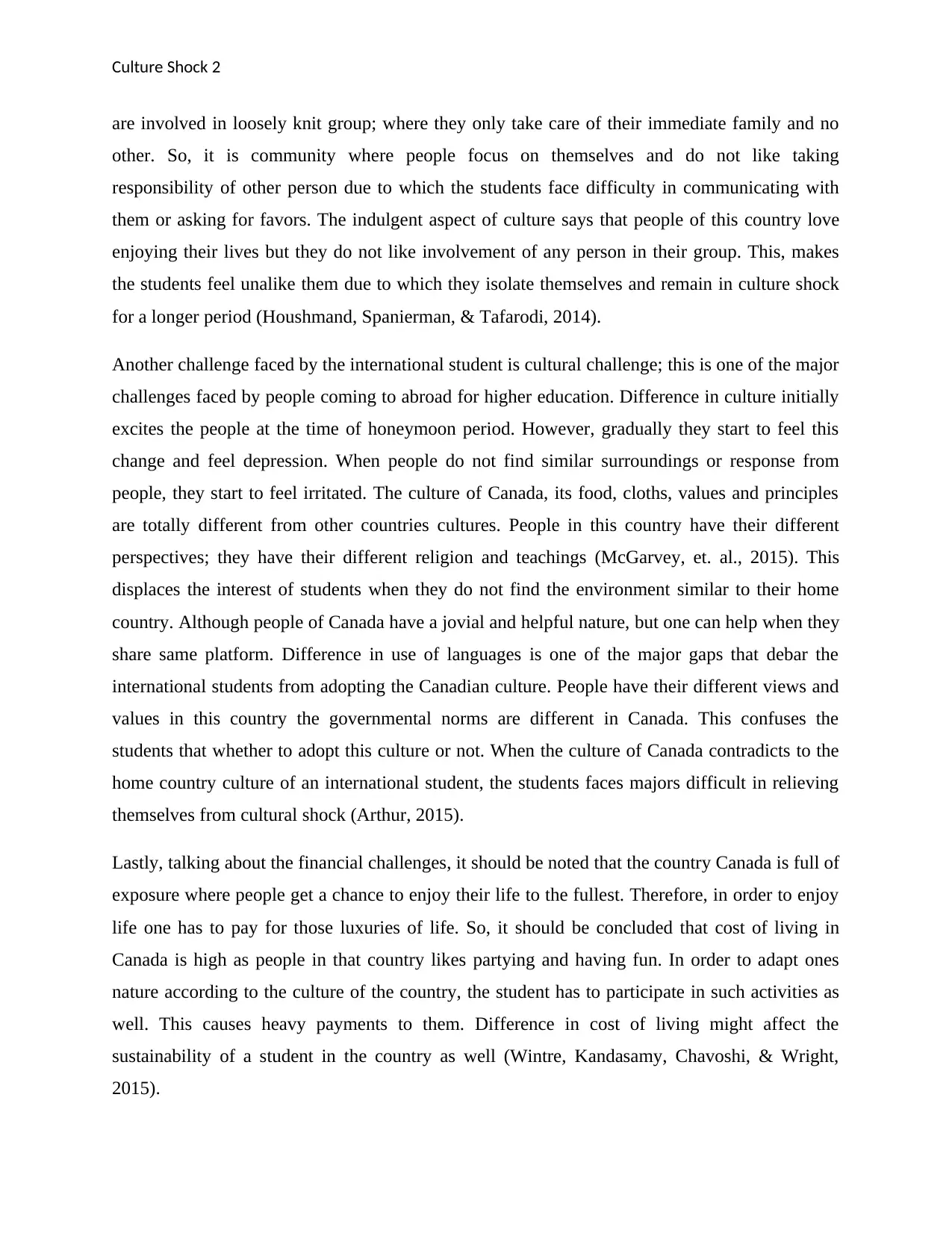
Culture Shock 2
are involved in loosely knit group; where they only take care of their immediate family and no
other. So, it is community where people focus on themselves and do not like taking
responsibility of other person due to which the students face difficulty in communicating with
them or asking for favors. The indulgent aspect of culture says that people of this country love
enjoying their lives but they do not like involvement of any person in their group. This, makes
the students feel unalike them due to which they isolate themselves and remain in culture shock
for a longer period (Houshmand, Spanierman, & Tafarodi, 2014).
Another challenge faced by the international student is cultural challenge; this is one of the major
challenges faced by people coming to abroad for higher education. Difference in culture initially
excites the people at the time of honeymoon period. However, gradually they start to feel this
change and feel depression. When people do not find similar surroundings or response from
people, they start to feel irritated. The culture of Canada, its food, cloths, values and principles
are totally different from other countries cultures. People in this country have their different
perspectives; they have their different religion and teachings (McGarvey, et. al., 2015). This
displaces the interest of students when they do not find the environment similar to their home
country. Although people of Canada have a jovial and helpful nature, but one can help when they
share same platform. Difference in use of languages is one of the major gaps that debar the
international students from adopting the Canadian culture. People have their different views and
values in this country the governmental norms are different in Canada. This confuses the
students that whether to adopt this culture or not. When the culture of Canada contradicts to the
home country culture of an international student, the students faces majors difficult in relieving
themselves from cultural shock (Arthur, 2015).
Lastly, talking about the financial challenges, it should be noted that the country Canada is full of
exposure where people get a chance to enjoy their life to the fullest. Therefore, in order to enjoy
life one has to pay for those luxuries of life. So, it should be concluded that cost of living in
Canada is high as people in that country likes partying and having fun. In order to adapt ones
nature according to the culture of the country, the student has to participate in such activities as
well. This causes heavy payments to them. Difference in cost of living might affect the
sustainability of a student in the country as well (Wintre, Kandasamy, Chavoshi, & Wright,
2015).
are involved in loosely knit group; where they only take care of their immediate family and no
other. So, it is community where people focus on themselves and do not like taking
responsibility of other person due to which the students face difficulty in communicating with
them or asking for favors. The indulgent aspect of culture says that people of this country love
enjoying their lives but they do not like involvement of any person in their group. This, makes
the students feel unalike them due to which they isolate themselves and remain in culture shock
for a longer period (Houshmand, Spanierman, & Tafarodi, 2014).
Another challenge faced by the international student is cultural challenge; this is one of the major
challenges faced by people coming to abroad for higher education. Difference in culture initially
excites the people at the time of honeymoon period. However, gradually they start to feel this
change and feel depression. When people do not find similar surroundings or response from
people, they start to feel irritated. The culture of Canada, its food, cloths, values and principles
are totally different from other countries cultures. People in this country have their different
perspectives; they have their different religion and teachings (McGarvey, et. al., 2015). This
displaces the interest of students when they do not find the environment similar to their home
country. Although people of Canada have a jovial and helpful nature, but one can help when they
share same platform. Difference in use of languages is one of the major gaps that debar the
international students from adopting the Canadian culture. People have their different views and
values in this country the governmental norms are different in Canada. This confuses the
students that whether to adopt this culture or not. When the culture of Canada contradicts to the
home country culture of an international student, the students faces majors difficult in relieving
themselves from cultural shock (Arthur, 2015).
Lastly, talking about the financial challenges, it should be noted that the country Canada is full of
exposure where people get a chance to enjoy their life to the fullest. Therefore, in order to enjoy
life one has to pay for those luxuries of life. So, it should be concluded that cost of living in
Canada is high as people in that country likes partying and having fun. In order to adapt ones
nature according to the culture of the country, the student has to participate in such activities as
well. This causes heavy payments to them. Difference in cost of living might affect the
sustainability of a student in the country as well (Wintre, Kandasamy, Chavoshi, & Wright,
2015).
⊘ This is a preview!⊘
Do you want full access?
Subscribe today to unlock all pages.

Trusted by 1+ million students worldwide
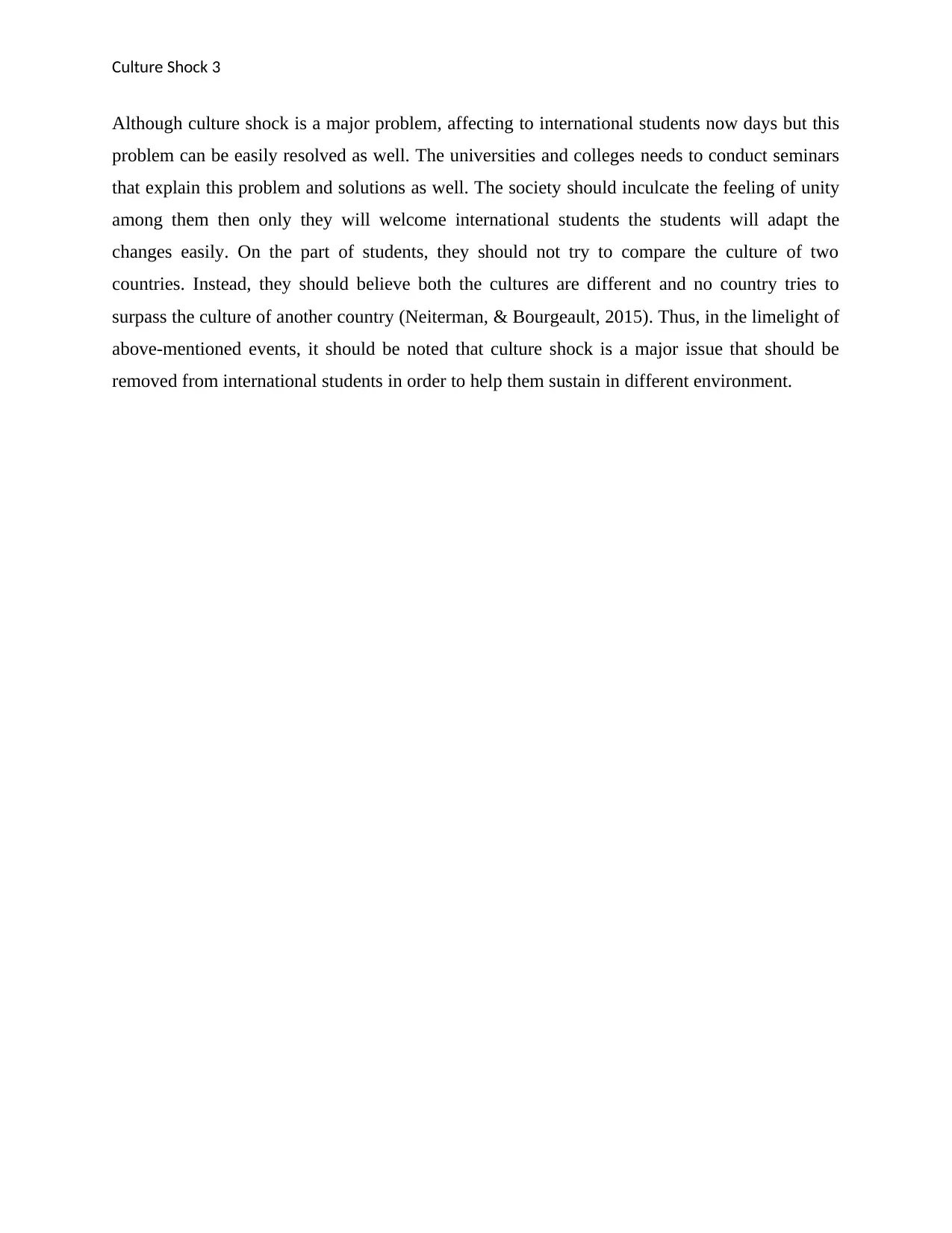
Culture Shock 3
Although culture shock is a major problem, affecting to international students now days but this
problem can be easily resolved as well. The universities and colleges needs to conduct seminars
that explain this problem and solutions as well. The society should inculcate the feeling of unity
among them then only they will welcome international students the students will adapt the
changes easily. On the part of students, they should not try to compare the culture of two
countries. Instead, they should believe both the cultures are different and no country tries to
surpass the culture of another country (Neiterman, & Bourgeault, 2015). Thus, in the limelight of
above-mentioned events, it should be noted that culture shock is a major issue that should be
removed from international students in order to help them sustain in different environment.
Although culture shock is a major problem, affecting to international students now days but this
problem can be easily resolved as well. The universities and colleges needs to conduct seminars
that explain this problem and solutions as well. The society should inculcate the feeling of unity
among them then only they will welcome international students the students will adapt the
changes easily. On the part of students, they should not try to compare the culture of two
countries. Instead, they should believe both the cultures are different and no country tries to
surpass the culture of another country (Neiterman, & Bourgeault, 2015). Thus, in the limelight of
above-mentioned events, it should be noted that culture shock is a major issue that should be
removed from international students in order to help them sustain in different environment.
Paraphrase This Document
Need a fresh take? Get an instant paraphrase of this document with our AI Paraphraser
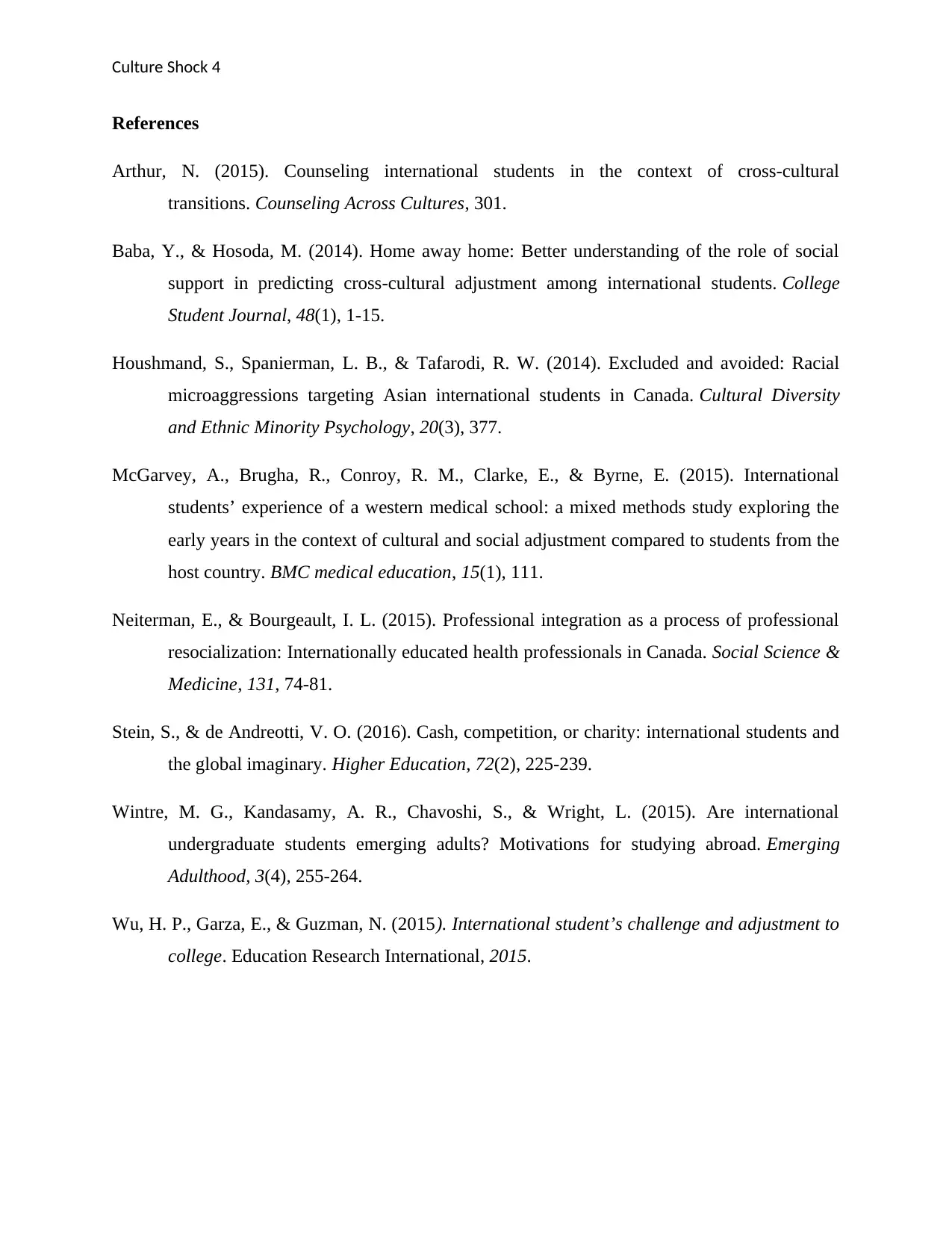
Culture Shock 4
References
Arthur, N. (2015). Counseling international students in the context of cross-cultural
transitions. Counseling Across Cultures, 301.
Baba, Y., & Hosoda, M. (2014). Home away home: Better understanding of the role of social
support in predicting cross-cultural adjustment among international students. College
Student Journal, 48(1), 1-15.
Houshmand, S., Spanierman, L. B., & Tafarodi, R. W. (2014). Excluded and avoided: Racial
microaggressions targeting Asian international students in Canada. Cultural Diversity
and Ethnic Minority Psychology, 20(3), 377.
McGarvey, A., Brugha, R., Conroy, R. M., Clarke, E., & Byrne, E. (2015). International
students’ experience of a western medical school: a mixed methods study exploring the
early years in the context of cultural and social adjustment compared to students from the
host country. BMC medical education, 15(1), 111.
Neiterman, E., & Bourgeault, I. L. (2015). Professional integration as a process of professional
resocialization: Internationally educated health professionals in Canada. Social Science &
Medicine, 131, 74-81.
Stein, S., & de Andreotti, V. O. (2016). Cash, competition, or charity: international students and
the global imaginary. Higher Education, 72(2), 225-239.
Wintre, M. G., Kandasamy, A. R., Chavoshi, S., & Wright, L. (2015). Are international
undergraduate students emerging adults? Motivations for studying abroad. Emerging
Adulthood, 3(4), 255-264.
Wu, H. P., Garza, E., & Guzman, N. (2015). International student’s challenge and adjustment to
college. Education Research International, 2015.
References
Arthur, N. (2015). Counseling international students in the context of cross-cultural
transitions. Counseling Across Cultures, 301.
Baba, Y., & Hosoda, M. (2014). Home away home: Better understanding of the role of social
support in predicting cross-cultural adjustment among international students. College
Student Journal, 48(1), 1-15.
Houshmand, S., Spanierman, L. B., & Tafarodi, R. W. (2014). Excluded and avoided: Racial
microaggressions targeting Asian international students in Canada. Cultural Diversity
and Ethnic Minority Psychology, 20(3), 377.
McGarvey, A., Brugha, R., Conroy, R. M., Clarke, E., & Byrne, E. (2015). International
students’ experience of a western medical school: a mixed methods study exploring the
early years in the context of cultural and social adjustment compared to students from the
host country. BMC medical education, 15(1), 111.
Neiterman, E., & Bourgeault, I. L. (2015). Professional integration as a process of professional
resocialization: Internationally educated health professionals in Canada. Social Science &
Medicine, 131, 74-81.
Stein, S., & de Andreotti, V. O. (2016). Cash, competition, or charity: international students and
the global imaginary. Higher Education, 72(2), 225-239.
Wintre, M. G., Kandasamy, A. R., Chavoshi, S., & Wright, L. (2015). Are international
undergraduate students emerging adults? Motivations for studying abroad. Emerging
Adulthood, 3(4), 255-264.
Wu, H. P., Garza, E., & Guzman, N. (2015). International student’s challenge and adjustment to
college. Education Research International, 2015.
1 out of 5
Related Documents
Your All-in-One AI-Powered Toolkit for Academic Success.
+13062052269
info@desklib.com
Available 24*7 on WhatsApp / Email
![[object Object]](/_next/static/media/star-bottom.7253800d.svg)
Unlock your academic potential
Copyright © 2020–2026 A2Z Services. All Rights Reserved. Developed and managed by ZUCOL.




